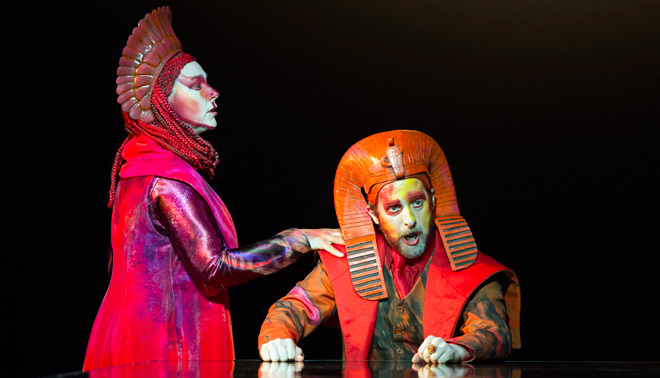
MOSES IN EGYPT WNO at Wales Millennium Centre
Music: Gioachino Rossini
Libretto: Andrea Leone Tottola, after ‘L’Osiride’ by Francesco Ringhieri
Director: David Pountney
Reviewer: Barbara Michaels
Rating: [4.00]
Musically flowing majestically from one theme to another, Moses in Egypt is one of the least often performed of Rossini’s operas. And what a pity that is. From start to finish, this opera – described as ‘tragico-sacra’ and based on the Exodus story of the Israelites flight from slavery in Egypt, is one to appreciate and enjoy on so many different fronts. An added bonus, for this new production by Welsh National Opera, is that it is one to which suits WNO down to the ground. The reason for this is abundantly clear from the start, for the chorus is one of WNO’s many strong points, and the huge scale of the music of this dual-themed opera is a perfect vehicle for their amazing talent.
Act I opens to a darkened stage. Atmospheric and spine-tingling, it heightens the senses as we listen to the off-stage singing. The darkness clears, engendered by the wave of his staff from a be-sandaled and white robed Moses, who raises his hands to God in a paean of thanksgiving and in exhortation to the Egyptians to forsake their wicked ways. Hungarian singer Miklós Sebestéyn gives us a prophet per se, with grey locks curling down to his shoulder and a resonant bass baritone. This is not an easy role to interpret, but the interpretation of it can make or mar a production, and Sebestéyn has most definitely got it right. As, indeed, has Andrew Foster-Williams as the weak and vacillating Pharoh, changing his mind from one moment to the next when exhorted by Moses to ‘Let my people go!’ On the distaff side, Christine Rice is magnificent as Pharoh’s wife Amaltea, particularly in the grand arias of Act II.
In tandem with the Old Testament Biblical theme is the love story of the racially impossible love affair between Pharoh’s son Osirides and the young Hebrew girl Elcia, a sympathetic portrayal as well as superb mastery of difficult and technically demanding arias by British soprano Claire Booth with sympathy. Spanish tenor David Alegret in a yellow-gold trouser has some wonderful duets with Booth and their voices work well together, although, with his flowing dark locks and in a yellow-gold trouser suit Alegret does appear at times more rock star than opera singer..
Immensely important in an opera that includes scenes where God is heard to speak and in which miracles take place is the lighting, and lighting designer Fabrice Kebour proves more than equal to the task with some of the most striking lighting effects seen in opera, dealing superbly with its many difficulties. Not least of these, and one with which many other companies have struggled in the past, is the parting of the Red Sea in Act III; Kebour does his best with the lighting here, but nevertheless what should be a mega-dramatic moment is something of a damp squib.
Despite this, that superb master of the theatre, David Pountney, has once again hit the jackpot with this a colourful and inspired production. It is never easy to mount a little-known opera but this ‘Moses in Egypt’ (or Mosès in Egitto to give the original title) more than justifies his confidence in so doing.
Wonderful music, under the baton of that great conductor Carlo Rizzi, great interpretation, performance and singing, a brilliant Biblical spectacle and a romantic love story – surely enough for any audience.
Moses in Egypt will be performed in Bristol on Friday November 14.
Touring until the end of November.
Get The Chance has a firm but friendly comments policy.
